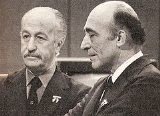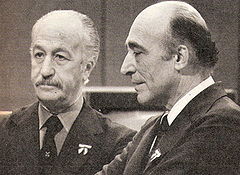
Francisco Manrique
Encyclopedia

Life and times
A native of MendozaMendoza, Argentina
Mendoza is the capital city of Mendoza Province, in Argentina. It is located in the northern-central part of the province, in a region of foothills and high plains, on the eastern side of the Andes. As of the , Mendoza's population was 110,993...
, in western Argentina, Francisco Manrique graduated from the Argentine Naval Academy in 1938 and from the Argentine Naval War College in 1949. After being jailed as an opponent of President Juan Domingo Perón, he became head of the presidential household in 1955 under the military leader, President Pedro Aramburu. Manrique resigned from the navy
Argentine Navy
The Navy of the Argentine Republic or Armada of the Argentine Republic is the navy of Argentina. It is one of the three branches of the Armed Forces of the Argentine Republic, together with the Army and the Air Force....
as a captain in the late 1950s to start a daily newspaper in opposition to President Arturo Frondizi
Arturo Frondizi
Arturo Frondizi Ercoli was the President of Argentina between May 1, 1958, and March 29, 1962, for the Intransigent Radical Civic Union.-Early life:Frondizi was born in Paso de los Libres, Corrientes Province...
, Correo de la Tarde, and in 1968 became a national television commentator.
The head of a military junta at the time, President Alejandro Lanusse appointed him Minister of Social Policy in 1971. In that capacity, he organized a myriad of federal and provincial health insurance programs into the Integrated Medical Attention Plan (PAMI) and housing assistance programs into the National Housing Fund (FONAVI). The reforms helped lead to a marked reduction in infant mortality in Argentina during the 1970s. Manrique ran for President in 1973 as the candidate of the Popular Federalist Alliance, a grouping of small, moderately conservative parties. He won 15 percent of the vote in the March 11, 1973 election
Argentine general election, March 1973
The first Argentine general election of 1973 was held on 11 March. Voters chose both the President and their legislators and with a turnout of 85.5%, it produced the following results:-President:...
, the most received by a third-party candidate in Argentina, up to then. His first wife, Esther Canepa Devoto, whom he married in 1943 and had three sons and a daughter with, died in 1977, and he married the former Cristina Ruíz in 1985.
Manrique actively supported the March 24, 1976 coup d'état
National Reorganization Process
The National Reorganization Process was the name used by its leaders for the military government that ruled Argentina from 1976 to 1983. In Argentina it is often known simply as la última junta militar or la última dictadura , because several of them existed throughout its history.The Argentine...
and many of his Federalist Party colleagues were therein appointed to local government posts, including 78 mayors. Following seven years of ruinous military rule, however, elections
Argentine general election, 1983
The Argentine general election of 1983 was held on 30 October and marked the return of Democracy after the 1976's dictatorship self-known as National Reorganization Process...
were called for October 1983. Manrique again ran unsuccessfully for President as the candidate of the center-right Federal Alliance. The winner, the centrist Radical Civic Union
Radical Civic Union
The Radical Civic Union is a political party in Argentina. The party's positions on issues range from liberal to social democratic. The UCR is a member of the Socialist International. Founded in 1891 by radical liberals, it is the oldest political party active in Argentina...
's Raúl Alfonsín
Raúl Alfonsín
Raúl Ricardo Alfonsín was an Argentine lawyer, politician and statesman, who served as the President of Argentina from December 10, 1983, to July 8, 1989. Alfonsín was the first democratically-elected president of Argentina following the military government known as the National Reorganization...
, appointed him Secretary of Tourism, a non-Cabinet position. He won election as a legislator
Argentine Chamber of Deputies
The Chamber of Deputies is the lower house of the Argentine National Congress. This Chamber holds exclusive rights to create taxes, to draft troops, and to accuse the President, the ministers and the members of the Supreme Court before the Senate....
in 1987 as a nonpartisan candidate on the Radical Civic Union ticket. Remaining editor-in chief of Correo de la Tarde, Francisco Manrique died in Buenos Aires
Buenos Aires
Buenos Aires is the capital and largest city of Argentina, and the second-largest metropolitan area in South America, after São Paulo. It is located on the western shore of the estuary of the Río de la Plata, on the southeastern coast of the South American continent...
from complications related to lymphoma
Lymphoma
Lymphoma is a cancer in the lymphatic cells of the immune system. Typically, lymphomas present as a solid tumor of lymphoid cells. Treatment might involve chemotherapy and in some cases radiotherapy and/or bone marrow transplantation, and can be curable depending on the histology, type, and stage...
, in 1988. He was 69 years old.

